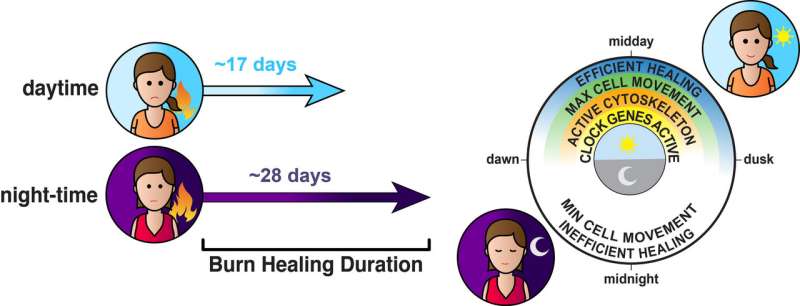Our body clocks cause wounds sustained at night to heal more slowly

A new study has discovered how our body clocks cause wounds, such as cuts and burns, to heal approximately 60% faster if the injury happens during the day rather than at night.
This could have implications for medical procedures such as surgery and provides targets for developing drugs that improve wound healing, according to the study led by scientists from the Medical Research Council (MRC) Laboratory of Molecular Biology in Cambridge, UK.
The study, published in Science Translational Medicine, is the first to show how our internal body clocks regulate wound healing by skin cells and optimise healing during the day.
Our body clocks - or circadian rhythm - regulate nearly every cell in the human body, driving 24-hour cycles in many processes such as sleeping, hormone secretion and metabolism. Tests using skin cells - fibroblasts and keratinocytes - and also in mice showed that during the internal body clock's 'daytime', wounds to the skin healed almost twice as efficiently as wounds incurred during the night.
The researchers found that this effect was mirrored in humans with burns, by collaborating with clinicians and analysing the records of 118 patients with burn injuries, using a database from all major burns units in England and Wales.
Burns that happened at night took an average of 60% longer to heal than burns that occurred during the day, with night-time burns (8pm to 8am) classed as 95% healed after an average of 28 days, compared to only 17 days if the burn happened in the day (8am to 8pm).
The researchers found a key reason for this faster healing was that skin cells moved to the site of the wound to repair it much faster during the body clock's daytime.
Within the cells, this was driven by the increased activity of proteins involved in cell movement and repair, especially the protein actin. Filaments of actin provide scaffolding and movement, acting like a muscle within the cell.
In daytime wounds, there was also more collagen - the main structural protein in skin - deposited at the wound site, which continued for up to two weeks after the wound occurred.
The researchers noted that this process must be driven by the cells' internal circadian clocks, not signals transmitted throughout the body, since human and mouse skin cells grown in a laboratory dish showed the same effect.
Dr John O'Neill, senior author on the paper from the MRC Laboratory of Molecular Biology, said: "This is the first time that the circadian clock within individual skin cells has been shown to determine how effectively they respond to injuries. We consistently see about a 2-fold difference in wound healing speed between the body clock's day and night. It may be that our bodies have evolved to heal fastest during the day when injuries are more likely to occur.
"For people who had burns, we found quite a big difference in wound healing speed, which agreed perfectly with the predictions we made based on our findings in the lab that wounds heal faster during the active phase (daytime in humans, night-time in mice). In both cells and mice, we can reset the tissue healing response by tricking the cells into thinking it's a different time of day - such as by turning the lights on at night and off at different times of day for the mice, or using body clock-altering drugs on cells in the lab. It may be that healing time could be improved by resetting the cells' clocks prior to surgery, perhaps by applying drugs that can reset the biological clock to the time of best healing in the operation site."
Dr Ned Hoyle, lead author on the paper from the MRC Laboratory of Molecular Biology, said: "We've shown that the daily cycles in our body clock control how well cells can repair damaged tissue by affecting an essential protein called actin. Efficient repair of our skin is critical to preventing infection, and when healing goes wrong wounds can become chronic or excessive scarring can occur. Further research into the link between body clocks and wound healing may help us to develop drugs that prevent defective wound healing or even help us to improve surgery outcomes."
Dr John Blaikley, an author on the study and clinician scientist from the University of Manchester, who contributed to the analysis of burns patients, said: "Treatment of wounds costs the NHS around £5 billion a year, which is partly due to a lack of effective therapies targeting wound closure. This research, for the first time, shows how circadian factors are important for wound healing. By taking these into account, not only could novel drug targets be identified, but also the effectiveness of established therapies might be increased through changing what time of day they are given."
The authors caution that more research is needed to understand the effects in humans, especially whether changes to current surgical practice would be beneficial.
More information: N.P. Hoyle el al., "Circadian actin dynamics drive rhythmic fibroblast mobilization during wound healing," Science Translational Medicine (2017). stm.sciencemag.org/lookup/doi/ … scitranslmed.aal2774

















